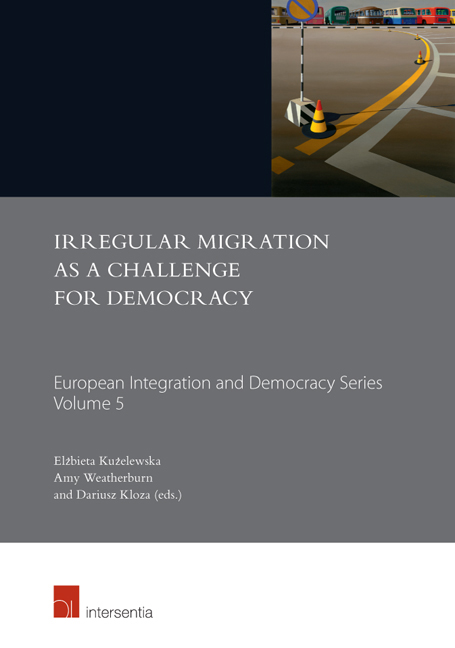Book contents
- Frontmatter
- Foreword
- Introduction
- Contents
- List of Abbreviations
- PART I The European Integration Project And Irregular Migration: Upholding Fundamental Values And Principles
- 1 The ‘Migrant Crisis’: Member States’ or EU's Responsibility?
- 2 Solidarity in EU Asylum and Migration Law: A Crisis Management Tool or a Structural Principle?
- 3 EU Foreign Policy and Other EU External Relations in Times of Crisis: Forcing the Law to Overlap?
- 4 The Migration Crisis in Europe: The Implications for Trade and Labour in a Globalised Context
- 5 Has the Migration Crisis Challenged the Concept of the Protection of the Human Rights of Migrants? The Case of Ilias and Ahmed v. Hungary (Invited Contribution)
- 6 European Responses to the Mediterranean ‘Refugee Crisis’ and the Fear of Saving Lives (Invited Contribution)
- Part II Migrants, their Rights and the Limits Thereof
- Part III The Status Quo of Migration in Europe: Selected National Perspectives
5 - Has the Migration Crisis Challenged the Concept of the Protection of the Human Rights of Migrants? The Case of Ilias and Ahmed v. Hungary (Invited Contribution)
from PART I - The European Integration Project And Irregular Migration: Upholding Fundamental Values And Principles
Published online by Cambridge University Press: 12 October 2018
- Frontmatter
- Foreword
- Introduction
- Contents
- List of Abbreviations
- PART I The European Integration Project And Irregular Migration: Upholding Fundamental Values And Principles
- 1 The ‘Migrant Crisis’: Member States’ or EU's Responsibility?
- 2 Solidarity in EU Asylum and Migration Law: A Crisis Management Tool or a Structural Principle?
- 3 EU Foreign Policy and Other EU External Relations in Times of Crisis: Forcing the Law to Overlap?
- 4 The Migration Crisis in Europe: The Implications for Trade and Labour in a Globalised Context
- 5 Has the Migration Crisis Challenged the Concept of the Protection of the Human Rights of Migrants? The Case of Ilias and Ahmed v. Hungary (Invited Contribution)
- 6 European Responses to the Mediterranean ‘Refugee Crisis’ and the Fear of Saving Lives (Invited Contribution)
- Part II Migrants, their Rights and the Limits Thereof
- Part III The Status Quo of Migration in Europe: Selected National Perspectives
Summary
INTRODUCTION
In this chapter, we try to – partly – answer the question that the editors have raised when laying down the concept of this volume, namely whether the increased presence of migrants and asylum seekers among the population of a country and the legal responses to this phenomenon has challenged the commonly accepted notions of democracy, the rule of law and fundamental rights in Europe. In recent years, across Europe and also in the Hungarian political sphere (which in turn strongly influences and determines the legislative activity of the Hungarian Parliament), migration is conceptualised as a threat to national security and public safety. This narrative has called for, and resulted in, the introduction of special measures, including the establishment of the ‘crisis situation caused by mass-migration’ and the modification of the laws on migration, the criminal procedure and the criminal codes, among other responses.
In this chapter we reflect on the question whether the migration crisis has challenged the human rights protection of migrants, with a particular focus on the Hungarian national context. We start with a hypothesis that the said crisis has caused a tendency to restrict the enjoyment of human rights in Hungary. The analysis of whether or not such a tendency exists requires examination of both national legislation and the jurisprudence of national and international courts. For the scope of this short chapter, we will restrict ourselves to a critical overview of the most relevant elements of the current Hungarian legislation on incoming migrants in light of a recent relevant judgment of the European Court of Human Rights (ECtHR), namely Ilias and Ahmed v. Hungary (2017), in which the Court ruled against Hungary.
MIGRATION IN HUNGARY: THE STATUS QUO
RECENT DEVELOPMENTS IN THE HUNGARIAN REGULATION OF MIGRATION
Even before the Ilias and Ahmed v. Hungary judgment, there were several critical views expressed about the recent Hungarian rules intended to address the migration situation, culminating in the summer of 2015. These criticisms may be classified as follows. On the one hand, some of them challenged the constitutionality of the new ‘crisis situation caused by mass-migration’ (tömeges bevándorlás okozta válsághelyzet in Hungarian). On the other hand, other commentators contested the existence (or, in any case, the unavailability) of data which allegedly justified the introduction of this crisis situation and, later on, its extension to the entire territory of Hungary.
- Type
- Chapter
- Information
- Irregular Migration as a Challenge for Democracy , pp. 97 - 112Publisher: IntersentiaPrint publication year: 2018
- 2
- Cited by



